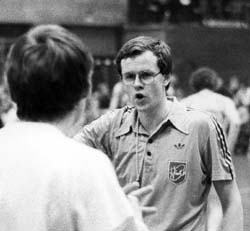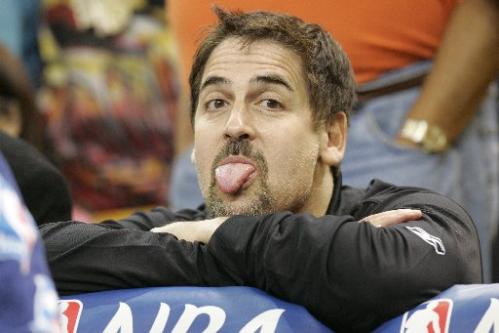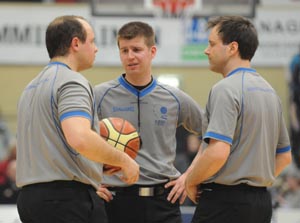 I dag har vi gleden av å publisere en artikkel skrevet av Europas fremste dommerinstruktør, engelske Alan Richardson, som siden han la opp som aktiv FIBA-dommer har vært instruktør på toppnivå for både Euroleague og FIBA. Richardson, som ved flere anledniniger har vært innleid som foreleser på norske dommersamlinger, har også være instruktør på den polske dommercampen "East meets West", og denne artikkelen har vært publisert på deres hjemmeside. I artikkelen nevner Richardson en rekke faktorer som er viktige for å lykkes som dommer i moderne basketball, og den bør være interessant å lese for ALLE dommere, helt uavhengig av antall års erfaring.
I dag har vi gleden av å publisere en artikkel skrevet av Europas fremste dommerinstruktør, engelske Alan Richardson, som siden han la opp som aktiv FIBA-dommer har vært instruktør på toppnivå for både Euroleague og FIBA. Richardson, som ved flere anledniniger har vært innleid som foreleser på norske dommersamlinger, har også være instruktør på den polske dommercampen "East meets West", og denne artikkelen har vært publisert på deres hjemmeside. I artikkelen nevner Richardson en rekke faktorer som er viktige for å lykkes som dommer i moderne basketball, og den bør være interessant å lese for ALLE dommere, helt uavhengig av antall års erfaring.
Alan Richardson:
I have recently read a number of messages from referees, commissioners and coaches expressing concerns about the relationship between referees, coaches and players.
At the risk of being accused of taking an over simplistic view, I have to say that game participants will do what the officials allow them to do. Referees have, at their disposal, a considerable amount of power in the game of basketball, but how and when they use that power is the key to successful officiating.
Basketball is an adversarial, athletic activity that encompasses all the human emotions, particularly success and failure. It has to be said that on many occasions when teams lose or players make mistakes, the officials are an easy scapegoat. As an official does that really surprise you?
The spectators will regularly tell you what they think about your officiating (especially when calls go against their team), and with the advent of the internet, there are many websites where their comments can be found in written form. Does this also surprise you?

Those two elements of on-court and off-court pressures are part and parcel of the game officials’ role, at whatever level you are working games. How you cope with these pressures and deal with them, will determine how successful you will be as an official. No two games are the same, even though the pressures are similar; some say that officials are only as good as there last game; others would say only as good as your last call.
Added to the game pressures are those of your personal and professional life; everybody and everything connected with you at home and work. Success in officiating demands a lot of sacrifices from those who wish to reach the highest levels. Time and money are the major sacrifices. Time away from work, home, family, partner and friends/colleagues. Money is the investment you make in terms of expenditure on transportation, equipment, accommodation, medical services, clinics, camps and publications.
What price can you put on your commitment and dedication to basketball? This is all down to the individual priorities, motivation, aspirations and personal situation of all officials working there way up through the different levels, in search of success in the professional and international arenas. Whatever the sacrifice, a top officials’ career is a relatively short one, with no pension or salary from officiating, once the international age limit has been reached at 50 years of age.
There is an element of luck, as well as possessing all the necessary qualities, required to achieve international fame and success. Many reach the top, many do not for various reasons; some to do with luck but the majority related to weaknesses in character and ability. An official needs to have a realistic image of his/her true ability and capability, especially those who aspire to higher levels of officiating. Competition for places is fierce and only the very best remain at the top after having reached it; many having reached the top, cannot sustain the necessary performances and fall by the wayside. Issues related to the officiating relationships:
Technical Fouls:
No one has ever said that referees should not call technical fouls upon players and/or coaches for misbehaviour. What has been said is that referees should handle such situations in a manner that does not reflect badly upon the referee calling the technical foul. In such an emotional environment, the referee should not be perceived as being emotionally punitive or “using a sledgehammer to break a peanut”. What is necessary is to define what is acceptable behaviour and communication during the game. Referees must try to transfer the behavioural standards they uphold in life into the basketball environment, without compromising those standards. If a coach or player makes a profane statement directly to a referee they should be penalised with a technical foul, no “ifs” and no “buts”. If a coach or player makes a profane statement that is not directed at a referee, maybe through frustration at individual or team errors, it should be dealt with sensibly, verbally and without stopping the game.
Referees must try to transfer the behavioural standards they uphold in life into the basketball environment, without compromising those standards. If a coach or player makes a profane statement directly to a referee they should be penalised with a technical foul, no “ifs” and no “buts”. If a coach or player makes a profane statement that is not directed at a referee, maybe through frustration at individual or team errors, it should be dealt with sensibly, verbally and without stopping the game.
Coaches and players who verbally and/or visually profanely abuse co-officials behind their backs should also be penalised immediately for such behaviour, but again in a manner that does not show the calling referee in a vindictive or punitive light. There is strength in quiet control and composure, qualities that are used to great effect by the very best referees. Invisibility is a great asset as a referee, the ability to be effective without really being noticed.
The manner in which a referee conducts himself/herself on the court in disciplinary matters will do much to build a level of respect with players, coaches and fellow officials. Referees are a team, supporting each other, respecting each other and above all working to the same ends, a successfully officiated game. Referees should not seek to undermine, embarrass or irritate co-officials, especially when they are dealing with emotional situations. Veteran officials may come to the aid of younger colleagues (when it is clearly required and in order to support rather than undermine) who are having difficulties with a coach or player(s).
The calling of technical fouls must be consistent and transparent to all participants and referees. There can only be one standard and all must adhere to that standard, not devalue it by unilateral “personal” interpretations or opinions. The game is bigger than any individual coach, player or referee.
Coaches:
Communication with participants is essential but not at the expense of changing the momentum of the game or permitting them to openly question decisions. Getting to know your coaches (and players) is an integral part of an official’s preparation for what to do when situations arise before, during and after the game. It is not a case of “do unto others as they do unto you”; treat everyone with the same level of respect. It is helpful if light hearted banter can be interjected into the otherwise serious conversations. Relationships are a block-building exercise, an ongoing development between two individuals who view different outcomes, but it can be a means to fostering respect and confidence. As in life and work it is not an easy process but one which enables progress and can have a cascade effect upon coaches, players and referees. Respect is earned; it is not given freely and never delude yourself into thinking that coaches/players like you because you are outgoing or humorous. They are primarily concerned with winning games and at the top level, their livelihoods depend upon it. If they do not recognise your integrity or ability as an official, the relationship is meaningless and without respect.
Respect is earned; it is not given freely and never delude yourself into thinking that coaches/players like you because you are outgoing or humorous. They are primarily concerned with winning games and at the top level, their livelihoods depend upon it. If they do not recognise your integrity or ability as an official, the relationship is meaningless and without respect.
Coaches (and players) appreciate fairness, application of common sense (feeling) and above all, consistency in competent performance. Referees are never going to please everyone all of the time, but you will earn respect if you work on your professionalism every time you officiate. Your attitude, approach and performance are paramount in the development and maintenance of good working relationships.
Spectators:
These are the members of the public who invariably have to pay for the privilege of watching the games you officiate. They are entitled to voice their opinions on what unfolds before them, whether it concerns coaches, players or officials. The behaviour of spectators, both verbally and physically is a well documented phenomenon in most sports. I do not wish to delve into the socio-psychological aspects of crowd behaviour other than to address some recent developments. Many spectators, particularly those who are relatively new to the recent expansion of top level basketball in Europe, have little or no knowledge of the “complexities” of the playing rules. They are solely concerned with the fortunes of their own team, not the opponents nor the officials. The two latter elements come to the fore when “their” team is losing the game. Crowd behaviour is part of the adversarial atmosphere of basketball and should not impinge upon an official’s ability to perform his duties and responsibilities without fear or favour.
Many spectators, particularly those who are relatively new to the recent expansion of top level basketball in Europe, have little or no knowledge of the “complexities” of the playing rules. They are solely concerned with the fortunes of their own team, not the opponents nor the officials. The two latter elements come to the fore when “their” team is losing the game. Crowd behaviour is part of the adversarial atmosphere of basketball and should not impinge upon an official’s ability to perform his duties and responsibilities without fear or favour.
In some countries, in some venues, the spectators are almost “legendary” because of the ferocity and fanaticism of their behavioural support. Over recent years, the bodies controlling competitions have taken a firmer line over dealing with spectator behaviour particularly in relation to physical reactions against match officials. I am not condoning unsportsmanlike behaviour, profane language, racist chants, violence or the irrational actions of individuals and/or groups before, during and after games. Officials and their nominating bodies have the powers to deal with any behaviour that has a direct bearing on the game and any of its participants. Actions which tarnish the image of the game should be reported and dealt with severely by the appropriate authorities.
Are we as officials consistent in our approach to dealing with such behaviour? The throwing of missiles, harmless or harmful onto the court is not an issue for blind eyes; neither is aggressive verbal and/or physical threats to officials after the game. Officials as a group, irrespective of experience and status, must be united and consistent in their approach to dealing with unsportsmanlike behaviour. Take care of business before business takes care of you.
Consistency:
This is the favourite catchphrase of coaches; it is a complaint regularly levied at referees by game participants, observers and by officials themselves. For officiating to be a rewarding experience we have a duty to ourselves and other officials to be consistent in the application of the rules, interpretations, mechanics and points of emphasis. Unfortunately, because of human fallibility, this is not always the case. I regularly read reports from commissioners, observers, coaches and club officials that they are seeing inconsistencies within the team of officials, even the top officials. Referees are human beings and even the top officials make mistakes. However, it is also clear that the margin of error within top level officials is far less than that which exists at lower levels. Officials have a duty to follow the guidelines without introducing their own “personal” interpretation of such guidelines; these actions lead to frustration and confusion amongst game participants. We have witnessed a dramatic improvement in the top level of officiating in recent years as the professional approach of referees, instructors and observers has sought to eliminate inconsistency and decrease errors.
The advent of technology has thrust officials into an unwanted spotlight. They are scrutinised now more than ever through television, internet, DVD, video and newspapers. The pressure to perform consistently has never been greater and the actions of officials in many sports are now daily talking points. Fortunately, the application of such technology is now being widely used in the training and analysis of referees and their performances to good effect. Fellow officials: Seeking favour with the game participants is not the way forward in terms of establishing meaningful relationships. Similarly I deplore the actions of those officials who seek to make capital for themselves at the expense of fellow officials. Referees are competitive by nature, but they must be team players and be seen to be so by the game participants. Whatever the combination of experience and ability within the team of officials it should produce a team performance encompassing good cooperation, communication, support and total respect for each other.
Fellow officials: Seeking favour with the game participants is not the way forward in terms of establishing meaningful relationships. Similarly I deplore the actions of those officials who seek to make capital for themselves at the expense of fellow officials. Referees are competitive by nature, but they must be team players and be seen to be so by the game participants. Whatever the combination of experience and ability within the team of officials it should produce a team performance encompassing good cooperation, communication, support and total respect for each other.
Areas of responsibility are clearly defined, with the flexibility for officials to help colleagues “outside” of such areas of responsibility. Situations arise when calls are made in close proximity to the nearest official by a colleague further away from the play. In such cases the calling official must be 200% certain of what has happened. It may be that the nearest official is momentarily unsighted, unsure (inexperienced) and out of position or more importantly that the official has a clear picture and does not whistle. The former is acceptable but the latter does not bode well for teamwork. Guesswork does not lead to good officiating and trust between officials is essential.
Veteran officials are expected to assist in the development and experience of lesser colleagues before, during and after the game. It is not a “show” for the veteran official, but a test of leadership. The growth of teamwork as exacerbated by the introduction of the three referee system, has led to a decline in the need for “star” referees. The “star” is now the team and the team is only as good as its weakest member; therefore the more experienced officials work hard to ensure the team success rather than individual success.
We have some truly outstanding officials in Europe, on a par with the best in the world; they embody what is good in officiating and alongside them are many aspiring young officials who will be the outstanding referees of the future.
With opportunity comes responsibility.
